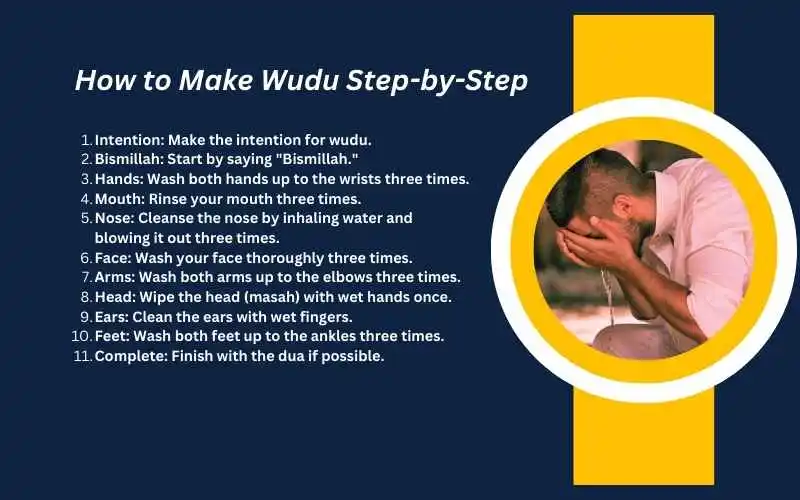A proper wudu begins with a proper understanding and knowing the Simple Wudu Steps, which helps you stay clean and focused before prayer. This easy process prepares your mind and body, keeping your worship pure and steady.
Wudu is the basic and most important cleaning step in Islam that is done before performing Salah and the Quran. Every part has meaning, from washing your hands to the final step, and it helps you feel calm and ready for worship.
In this article, we will discuss the Simple Wudu Steps in detail. We also learn some conditions that break wudu, important duas, and answers to common concerns, helping you keep your practice correct and easy to follow.
Meaning of Wudu
Wudu, also known as ablution, is the washing Muslims do before praying or reading the Quran. It shows both physical and spiritual cleanliness and helps prepare the body and mind for worship.
In Islam, wudu is more than just washing. It shows respect and focus. Knowing what ablation means in Islam helps you do each step the right way with care, keeping your prayer clean and sincere.
Preparing for Wudu
Before starting Wudu, you should get ready both in body and mind. This means making the intention to clean yourself and focusing on the worship you are about to do. Good preparation helps you follow every wudu step correctly and with attention.
Dua Before Wudu
Saying a dua before wudu helps you set your intention and remember that you are doing it for Allah. It makes your wudu both clean and spiritual. Doing each step correctly helps you stay pure and focused.
Arabic Dua: بسم الله
اللَّهُمَّ اجعلني من التوابين واجعلني من المتطهرين
Dua After Wudu
After finishing wudu, saying the dua lets you thank Allah for being able to do it. It also reminds you of the spiritual cleanliness gained from the ablution.
Arabic Dua: أَشْهَدُ أَنْ لَا إِلٰهَ إِلَّا اللَّهُ وَحْدَهُ لَا شَرِيكَ لَهُ وَأَشْهَدُ أَنَّ مُحَمَّدًا عَبْدُهُ وَرَسُولُهُ
Wudu Steps Explained
Doing wudu the right way is important for both body cleanliness and spiritual readiness. Following these steps makes sure each part of the ablution is done correctly, preparing you for prayer and reading the Qur’an.
- Make the Intention (Niyyah): Begin by silently making the intention to perform wudu for Allah. This mental preparation is the first step in the process.
- Wash Your Hands: Clean your hands up to the wrists three times, making sure water reaches every part.
- Rinse Your Mouth and Nose: Use your right hand to rinse your mouth and inhale water gently into your nose, then expel it.
- Wash Your Face: Wash from the hairline to the chin and from ear to ear three times. Ensure the entire face is covered.
- Wash Your Arms: Wash each arm up to the elbows, starting with the right arm, then the left. Repeat three times.
- Wipe Your Head (Masah): Wet your hands and wipe over your head once, from front to back and back to front.
- Clean Your Ears: Use your wet fingers to wipe the inside and outside of your ears.
- Wash Your Feet: Wash each foot up to the ankles, making sure water reaches between the toes, starting with the right foot.
By carefully following these wudu steps, you maintain both cleanliness and a sense of spiritual focus. This ensures your prayers are performed with full preparation and respect for the ritual.
Wudu Without Water
In a few situations, performing wudu with water is not possible, like when you are ill or travelling somewhere. Wudu without water allows every Muslim to maintain cleanliness and spiritual readiness even without access to water.
Doing wudu without water is called tayammum, which involves using clean soil or dust to purify the body symbolically. This way, your prayers and Qur’an recitation remain valid while following Islamic guidelines when water cannot be used.
Conditions That Break Wudu
There are some things that you have to avoid to maintain your Wudu; otherwise, it can be broken. In this section, we tell you about these actions or occurrences so that you can maintain purity before prayer:
- What Breaks Wudu: For maintaining Wudu, you have to keep yourself away from anything that causes major impurity or nullifies the ablution, like natural body discharges and certain acts that remove spiritual cleanliness.
- What Breaks Wudu for a Man: Men should break their Wudu by common causes, including urination, passing gas, deep sleep, or anything that involves bodily excretion.
- What Breaks Wudu for a Woman: Usually, women should also avoid similar reasons like men to maintain Wudu, in addition to menstrual bleeding or postpartum bleeding, which require full purification.
- What Breaks Wudu According to the Quran: According to the Qur’an, reasons like discharges, touching private parts without barrier, or anything that causes impurity will nullify wudu. So always maintain cleanliness to maintain Wudu.
Specific Situations
There are also some additionally things that can affect wudu, and it is very important for you to know them because they are from everyday situations. The following are these situations:
- Does Bleeding Break Wudu: If you have a minor cut or nosebleeds, then it can not break wudu, but in the case that the blood flows beyond the area, then it can break Wudu.
- Does Smoking Break Wudu: Usually, smoking does not affect the Wudu directly, but you have to avoid it because it can affect spiritual cleanliness and focus before prayer.
- Does Burping Break Wudu: Burping alone does not break wudu. Only actions that involve the release of bodily waste can invalidate the ablution.
- Does Sleeping Break Wudu: Having a light sleep, like nodding off while sitting, does not break the Wudu, but deep sleep, where one loses awareness, can be the reason for losing Wudu.
FAQs
What if Wudu Breaks During Prayer?
In this situation, if the wudu gets broken during prayer, then the prayer becomes invalid. You have to do the wudu steps again and perform the prayer again.
Does Ghusl Count as Wudu?
Yes, because in ghusal, all the wudu steps are included, so it can fulfil the requirements of wudu. But the intention must be made, and proper steps should be followed to confirm validity.
Can You Read Quran Without Wudu?
Usually, reading the Qur’an without wudu is generally not allowed. It’s important to maintain ablution for respect and spiritual cleanliness while reciting Allah’s words.
Does Sleeping Break Wudu?
If you have a deep sleep that causes a complete loss of awareness can break wudu, while a light sleep or brief dozing does not affect it.
Does Smoking Break Wudu?
Smoking does not invalidate wudu, but it is better to avoid it right before prayer. Maintaining spiritual and physical cleanliness helps you perform your worship with focus and respect.
Final Verdict
Having the knowledge about the wudu steps is important for both spiritual and physical cleanliness. You also have to understand the circumstances that can be the reason for breaking wudu, how to handle specific situations, and the duas to recite before and after ablution to confirm that your prayers and Qur’an recitation remain valid and focused.
If you want to master the correct wudu steps and deepen your understanding of Islam, MyQuranTutor.com offers simple, guided Qur’an and Islamic lessons for all ages. With qualified tutors and interactive online classes, you can easily learn wudu, Salah, duas, and Qur’an recitation with proper tajweed, right from home.








